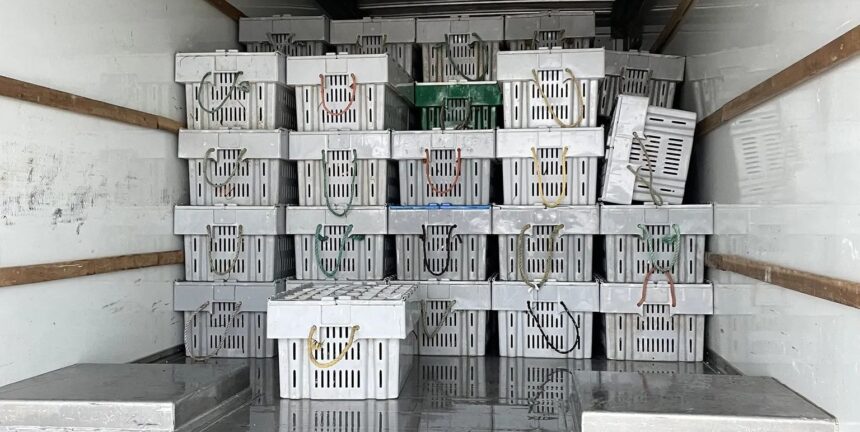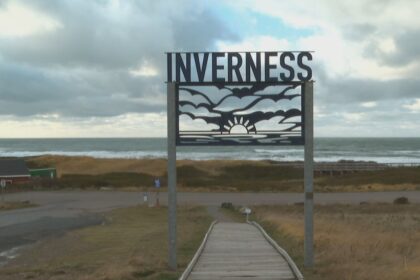Federal action has increased, but private investigators were needed to build the case for a recent lawsuitPublished Nov 13, 20257 minute readOver 8,000 lobster were seized by DFO at a Delaps Cove fish plant. Photo by ContributedArticle contentOn Nov. 5, federal fisheries officers simultaneously blocked the roads leading into two plants owned by one of southwest Nova Scotia’s big lobster buyers.THIS CONTENT IS RESERVED FOR SUBSCRIBERS ONLY.Subscribe now to access this story and more:Unlimited access to the website and appExclusive access to premium content, newsletters and podcastsFull access to the e-Edition app, an electronic replica of the print edition that you can share, download and comment onEnjoy insights and behind-the-scenes analysis from our award-winning journalistsSupport local journalists and the next generation of journalistsSUBSCRIBE TO UNLOCK MORE ARTICLES.Subscribe or sign in to your account to continue your reading experience.Unlimited access to the website and appExclusive access to premium content, newsletters and podcastsFull access to the e-Edition app, an electronic replica of the print edition that you can share, download and comment onEnjoy insights and behind-the-scenes analysis from our award-winning journalistsSupport local journalists and the next generation of journalistsRegister to unlock more articles.Create an account or sign in to continue your reading experience.Access additional stories every monthShare your thoughts and join the conversation in our commenting communityGet email updates from your favourite authorsSign In or Create an AccountorArticle contentOfficers were seen leaving Independent Fisheries plants in Sable River, N.S., and Dipper Harbour, N.B., carrying boxes full of papers.Article contentArticle contentThis latest “inspection,” as it’s being called by Fisheries and Oceans Canada (DFO), follows a series of raids on other big lobster processors over recent months that resulted in thousands pounds of lobster seized and released.Article contentArticle contentIt happens as the change long called for by both commercial fishermen and frontline fisheries officers appears to be coming for DFO’s top brass.Article contentWhether it’s a harbinger of repairs to the federal government’s damaged relationship with the commercial fishery and the coastal communities of Atlantic Canada that rely upon it remains to be seen.Article content“No comment, just a routine check,” Amanda Hemeon, office manager for Independent Fisheries, told The Chronicle Herald on Wednesday.Article contentDFO acknowledged it had done inspections.Article content“During inspections, it is common practice for fishery officers to copy business records so that they may be compared to information previously reported by the business and via other sources,” reads a statement from Debbie Buott-Matheson, spokeswoman for DFO.Article content“Inspections are not searches or investigations; however, an inspection could result in an investigation if irregularities are discovered. The inspections conducted Nov. 5 did not result in the seizure of any lobster. As the process remains ongoing, no further details will be made available.”Article contentArticle contentArticle contentIndependent Fisheries’ lawsuitArticle contentAccording to Independent Fisheries’ website, the company processes $160-million worth of lobster annually.Article contentHemeon also declined to comment on the lawsuit against Independent Fisheries and its owner, Xiaoming Mao, by commercial fishermen alleging the company has been buying First Nations lobster harvested outside the commercial season from a federal government-owned wharf in Saulnierville.Article contentAfter watching an unlicensed lobster fishery operating outside the commercial season by First Nations members claiming a moderate livelihood right grow over a decade with little federal or provincial intervention, the United Fisheries Conservation Alliance hired private investigators to track the movement of lobster.Article contentAccording to the notice of action for the $10-million lawsuit filed by the UFCA last November, “The lobster obtained by the defendants at the Saulnierville wharf is not caught by a licence-holder and therefore cannot be legally sold. The illegal lobster is transported by various means to a fish plant owned by Independent Fisheries Ltd. in Sable River, Nova Scotia. Independent knowingly takes delivery of the illegal lobster and subsequently profits from its sale.”Article contentThe lawsuit’s allegations have not been proven in court.Article contentThe owner – Xiaoming MaoArticle contentMao has become a big player in Nova Scotia’s seafood industry over the past five years.Article contentMao ran Atlantic Chican Seafood’s plants through a period when they pleaded guilty to charges of being in possession of egg-bearing lobster and then of importing 63,000 pounds of lobster from Maine for export to China relabeled as Canadian lobster.Article contentArticle contentMao was “let go” from Atlantic Chican in 2019, according to John Crandall Nickerson, who was brought in to run the operation.Article contentWith capital from unknown sources, Mao bought Independent Fisheries and its plant in Sable River in 2020.Article contentAccording to provincial property records, in 2023 he became a director of B.M.C. Seafoods Ltd., which owns a large plant in Meteghan. In April 2024, he became president of Oceans Edge Seafoods, which owns a plant in Salmon River.Article contentThe following month, a numbered company of which Mao is a director was one of three firms that purchased the American company Lobster Boys LLC, which owns the lobster-buying and processing facility in Dipper Harbour, N.B.Article contentUnusual lawsuit characteristicsArticle contentAs of Wednesday, none of the defendants to the suit, which also include Fisher Direct Ltd., Sea Well Holdings Ltd., Jason Lamrock, Tyler Nickerson, Sandra Nickerson, Shawna Nickerson, David Nickerson and Wesley Nickerson, have filed a defence.Article contentArticle content“Independent has sought to compel further details of the claim from UFCA and that has delayed matters,” said Michel Samson, lawyer for the UFCA.Article content“UFCA’s position is that Independent knows exactly what it has done and Independent does not need further information to file a defence. The court will rule on that question sometime soon.”Article contentThe lawsuit is unusual in that it sees private parties funding their own investigation and seeking redress for alleged violations of federal law (the Fisheries Act). Normally, that would be the responsibility of federal and provincial (responsible for fish processing licensing) law enforcement and prosecution services.Article contentEnforcement issuesArticle contentThat investigation was being pursued last year as 35 frontline fisheries officers in Nova Scotia and New Brunswick submitted “refusal to do unsafe work” letters under the Canada Labour Code, claiming a lack of support from top brass in their department. The letters cited violence against officers by armed unlicensed fishers and threats against their families.Article content“These have included physical acts of violence against officers, attempted assaults using vehicles and vessels, harvesters attempting to disarm fishery officers from their sidearms, and utterances of violence and death threats towards officers and their families,” reads one of the letters obtained by The Chronicle Herald.Article contentThe letter went on to state that officers have no support from senior management and public statements made by then-federal fisheries minister Diane Lebouthillier had made their jobs dangerous.Article contentThe officers sought body armour capable of stopping high-powered rifle rounds, body-worn cameras to document their interactions with unlicensed fishers and drug training.Article contentRetired DFO area chief Alan Clark told The Chronicle Herald in a written statement last year that the problem stems from appointing “career bureaucrats” to top-level enforcement positions.Article contentArticle content A lobster sits on the shore. Photo by Kathy Johnson /Kathy JohnsonArticle contentJeffrey Pope, a senior investigator with Employment and Social Development Canada, ultimately agreed with the officers and directed DFO to “take measures to correct the condition that constitutes the danger immediately.”Article contentDFO claims to have done that.Article contentLast winter, a retired Mountie was appointed to DFO’s chief enforcement officer role.Article contentPeter Lambertucci’s LinkedIn profile boasts of his having “developed increasingly senior roles leading Counter Terrorism, National Security, Serious & Organized Crime, Financial Crime, Money Laundering, and critical incident management” that brought a more law enforcement-oriented skillset than previous appointees to the role.Article contentThrough the summer and fall of this year, enforcement has picked up. According to DFO, since June 1 it has seized six fishing boats (all of which remain in DFO custody), 1,501 traps and nearly 28,000 lobsters (which were returned to the water) in southwest Nova Scotia. It has also done 65 fish plant inspections.Article contentArticle contentA large share of the catch, 115 crates containing 8,028 lobsters, was seized Oct. 16 at a commercial fish plant in Delaps Cove. One man was arrested for violations under the Fisheries Act.Article contentRecent lobster bustsArticle contentWhile DFO refused to specify which plant was busted, there is only one commercial plant in the identified community, Delaps Cove Fish Products Ltd. According to the Registry of Joint Stock Companies, the directors of Delaps Cove are Allan Longmire, Patricia Longmire, Reginald Leblanc and Marcel Leblanc.Article contentBoth Reginald and Marcel Leblanc are directors of Wedgeport Lobster, a prominent Nova Scotia lobster buyer.Article contentNeither Reginald Leblanc nor Allan Longmire responded to requests for comment.Article contentAccording to DFO, the lobsters were caught under a First Nations food, social and ceremonial licence and are not allowed to be sold or bought. They refused to provide any other details as the “investigation is ongoing.”Article contentMeanwhile, another bust happened on Oct. 16 at a plant in Queens County that also hasn’t been identified by DFO. The lobster had been caught in the St. Peters Canal area of Cape Breton, which is currently closed to fishing. DFO officers arrested a man in Port Mouton found with 6,466 lobsters for possession and for making false statements to a fisheries officer. All the lobsters were transported back and released.Article contentOn Thursday, DFO confirmed that its deputy minister, Annette Gibbons, has announced her retirement. A successor has not yet been chosen.Article contentGibbons, along with associate deputy minister Adam Burns, regional director General Doug Wentzell and director of enforcement policy and programs Brent Napier, were raked over the coals by MPs during a special meeting of the House of Commons Standing Committee on Fisheries and Oceans last February over an alleged lack of enforcement of the Fisheries Act.Article contentArticle content“You’ve had nearly a 50 per cent increase in your staff, over a doubling of DFO’s budget since 2015, since this government got elected, what do you need to get the job done?” asked Newfoundland and Labrador MP Clifford Small. “Is it possible that you can actually do the job?”Article contentGibbons responded that her department was working on traceability regulations that would enable DFO to bring fisheries in Atlantic Canada under control.Article contentOn Wednesday, UFCA president Colin Sproul welcomed the increased enforcement and changes at the top of DFO but also warned that the federal government has a long way to go.Article content“No matter what direction the fisheries minister or the prime minister want to take on this issue, they need to face the fact that for the last 10 years there is a bureaucracy from top to bottom at DFO that has facilitated illegal activity,” said Sproul.Article content“And the people involved need to be cleaned out from top to bottom. Not just to bring rational enforcement back and protect conservation of the resource but, and just as importantly, to rebuild trust with coastal communities who have none left with this government or with DFO to look out for their interests in any way.”Article content
Fisheries busts rise with former Mountie in DFO enforcement role. Can DFO win back the trust of Atlantic fishing communities?











